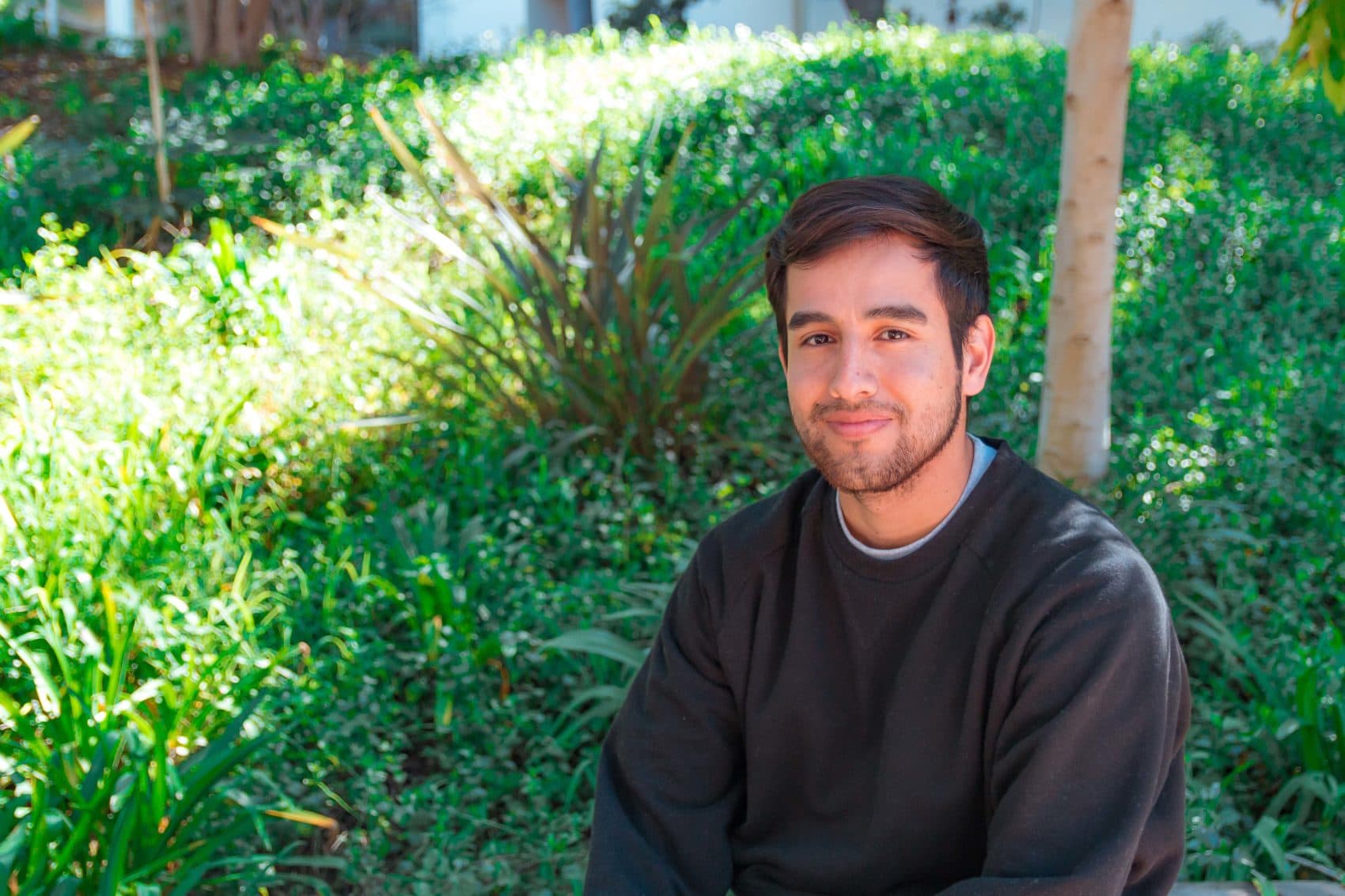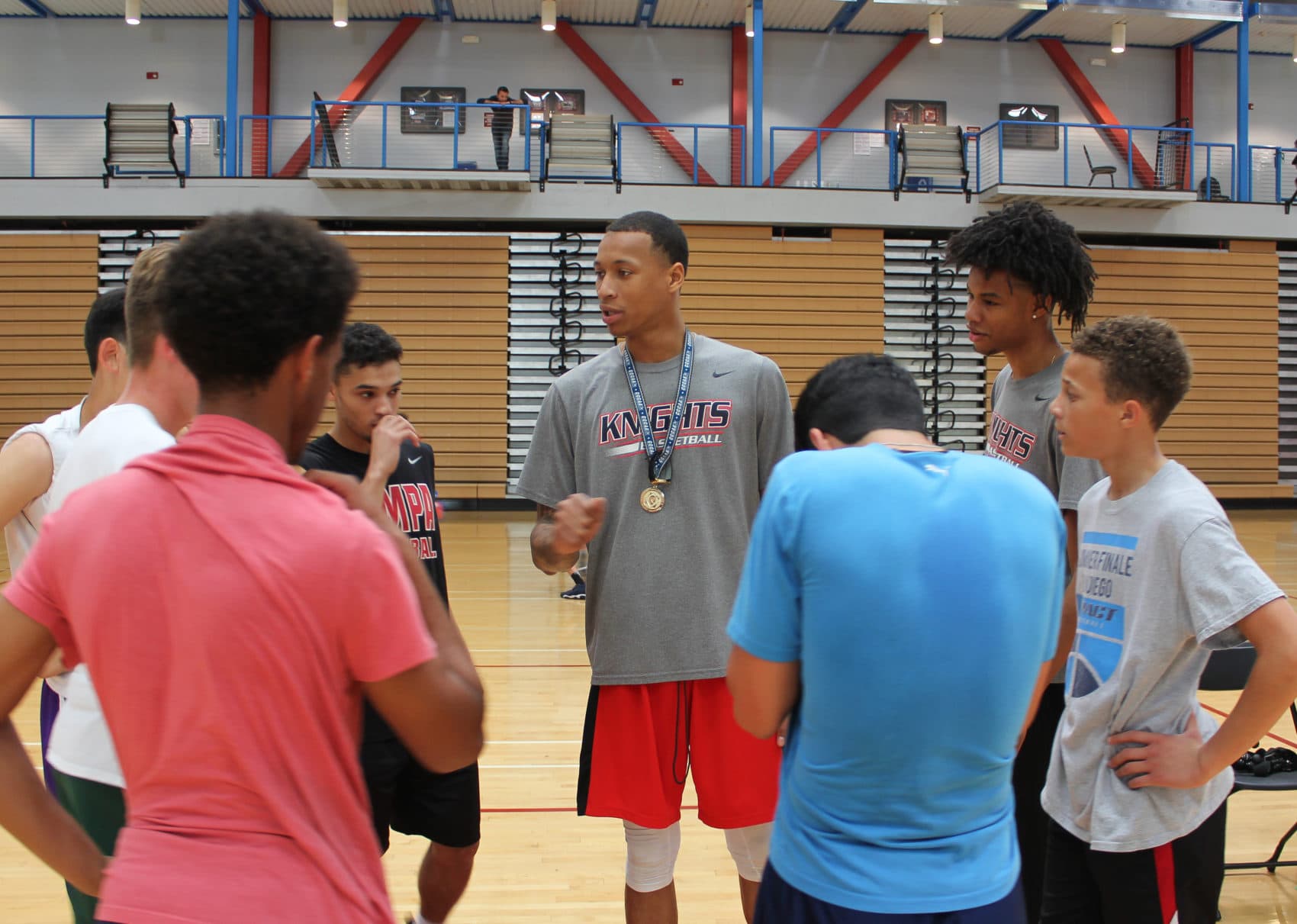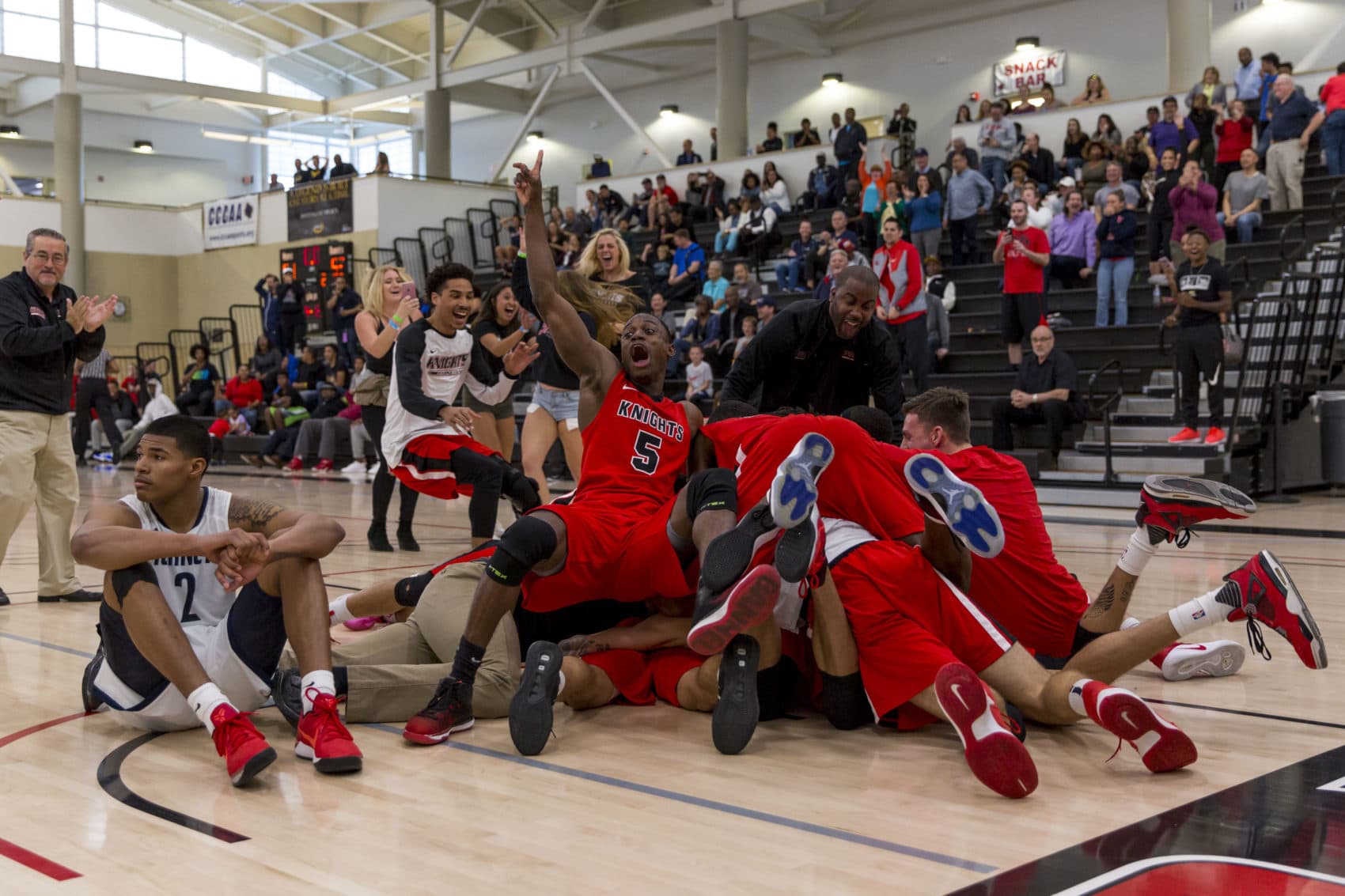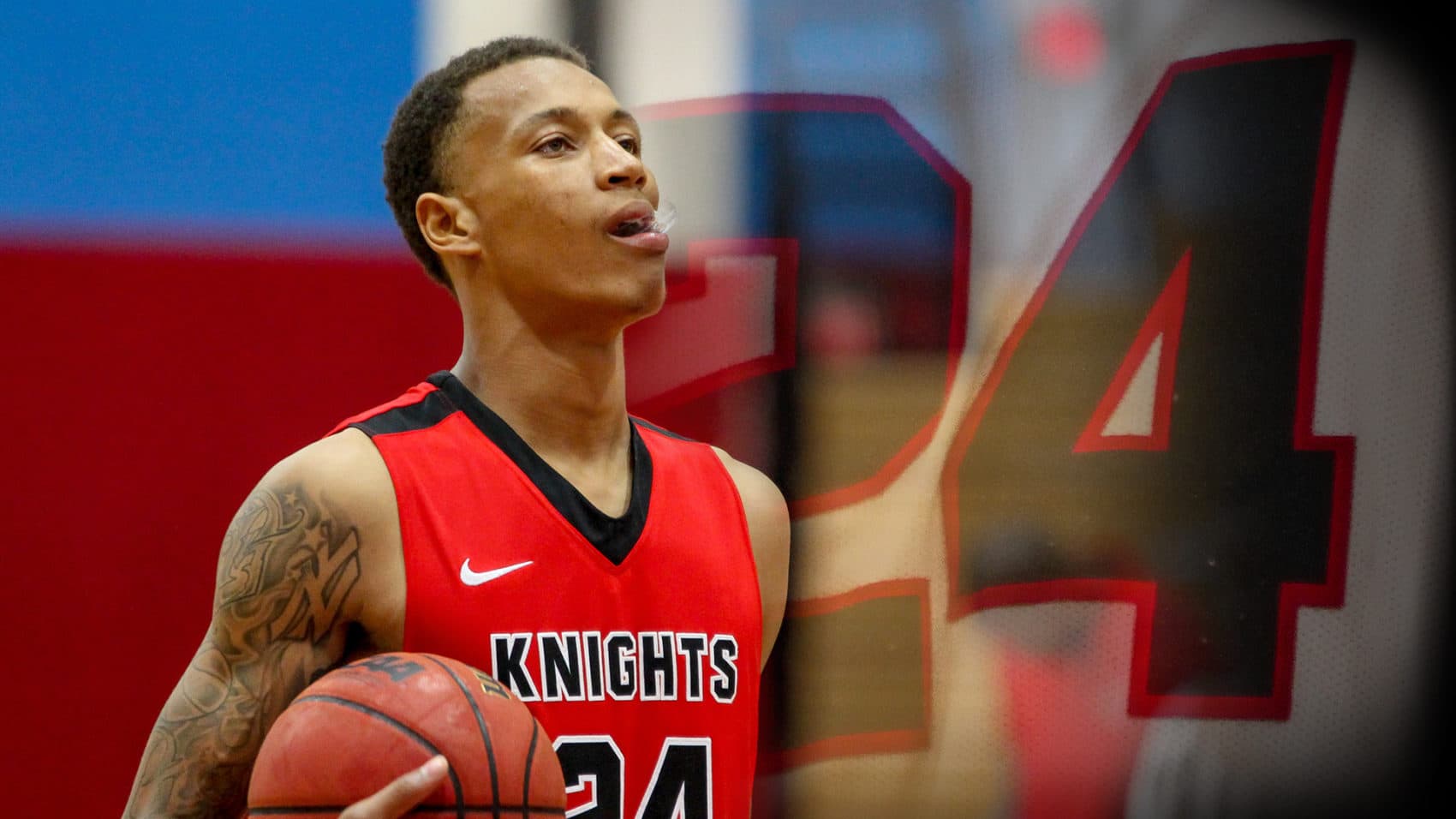Advertisement
Nate And David: A Story Of Basketball, Friendship And Mental Health
Resume
Editor’s Note: This story discusses mental illness and suicide. Please use your discretion.
Three of the most important men in Cassandra Edwards’ life are named Nate.
"I have big Nate, who is my husband, Little Nate and then Baby Nate," Cassandra says.
Her grandson, Baby Nate, is 4 years old now.
"Looks just like his father at that age," Cassandra says. "Acts just like his father at that age. And I did say to him, ‘You remind me so much of your daddy.’ He said, ‘But Nana, my daddy’s dead.’ And I said, ‘But your daddy’s in you, you know?’ And he just hugged me. He said, ‘It's OK, Nana. It's OK.’ "
Edwards and her husband raised their son in Spring Valley, a majority-minority suburb of New York City. Little Nate grew to be 6-foot-8, and in 2016, he got a scholarship to play basketball at a junior college in San Diego. Cassandra wasn't worried about him being far away from home.
"To be honest with you, I wanted him to be out of our environment, here — and be exposed to something different," Cassandra says. "So for me, it was a safe haven for him to get away."
But that safe haven couldn’t protect Nate Edwards from what was to come. Just six weeks before the end of the school year, Cassandra Edwards would learn that her son had died, leaving behind his girlfriend, Amber Koedyker, and two sons, Baby Nate — who was 2 at the time — and Dallas, just 8 months old.
'I Want To Be Able To Tell My Son's Story'
When Cassandra Edwards met with the president of San Diego City College, she had one request.
" ‘I want to be able to tell my son's story,’ " she recalls saying. " ‘I don’t want anyone else to do that. I want to tell his story, because I think he's going to help save many lives.’ "
But in the late summer of 2018, a student video project started getting a lot of buzz. Cassandra wasn’t happy.
"No, I wasn’t happy at all," she says. "I didn’t know who he was. And I didn’t know what his agenda was."
The documentary project was linked to a GoFundMe account that was raising money to send Nate Edwards’ children to college. But nobody had told Cassandra about this. Nobody had set up a trust in her grandsons’ names. How could she be sure the money would end up where it belonged?
Cassandra needed answers. So she called up the student filmmaker. His name is David Pradel.
"And we, you know, talked on the phone and I told her, you know, everything," David says.
"And it turns out this kid is just as innocent as he wants to be," Cassandra says.
The story Cassandra heard that day not only changed the way she saw David and his video project. It also changed the way she remembers her son.
But before we go any further, I need to warn you: we’re going to explore the subject of suicide. This story might not be for everyone.

David Pradel's Journey
The story begins in the summer of 2016. David Pradel was headed into his final year of studying broadcast journalism at San Diego City College.
"I started to get overwhelmed mentally and physically," David says. "I wasn’t in the right mindset."
David had experienced anxiety and depression since high school. But that summer, his symptoms intensified. He started questioning everything he’d been doing for the past three years. Had he picked the right major? Was he talented enough to make a career out of it? Or had he just wasted his time?
Irrational thoughts took over every aspect of David's life.
"To the point where I couldn’t really eat," David says. "You know, I lost 30 pounds coming into my final year at City College."
David is not a big guy. So when he suddenly lost 30 pounds, people noticed.
"I told my professor that, ‘Oh, I just had a stomach flu. And I was a little sick over the summer.’ And I kind of brushed it off that it wasn’t really anything serious," David says.
"It got to a point where I did have these thoughts of suicide. I didn’t think there was another option."
David spent the first few weeks of the semester just going through the motions — attending classes, working on assignments — but he says his heart wasn’t in it.
Basketball Season
Along came October and the beginning of the basketball preseason. Basketball is David's favorite sport. So he figured: maybe he could find motivation to produce a season preview for his school newscast.
"So, I did it even though, deep down, I was struggling a bit," David says. "Their energy on the court when I was there was a little bit inspiring, in a way, to actually push myself and make a good video for the Friday newscast."

David posted some photos of that practice on social media. About a week later, he got a message from Nate Edwards.
It was just a couple of lines on Twitter thanking David for sharing the photos — telling him that he’d done a good job. Nate probably didn’t think twice about sending it. But David says, in that moment, it was exactly what he needed to hear.
"It felt good to get that support from a player who is, like, my age — and not a professor or a coach," David says.
He kept covering the basketball team. He even interviewed Nate.
Week by week, the team improved. And so did David. "Just the energy and the love that they had for each other during this time was infectious and motivating," he says. "And I used that to apply that to my classroom work and making the effort to be healthy."
David Pradel might not have felt this way — like he could draw energy from the team’s success — if not for Nate Edwards, who always made David feel like he was a part of the team.

David says Nate’s biggest basketball contributions came from the bench, where he was constantly supporting and encouraging his teammates.
And David felt that support and encouragement beyond the gym.
"Every time I post a photo on Instagram or post something on Twitter, he would be, like, the first 'Like'," David says.
David says he doesn't think Nate knew he was going through a hard time.
"I think, you know, if you’re on his team — you’re on his side — he's going to take care of you," David says.
Nate’s teammates noticed his kindness, too.
David interviewed Jahmere Mitchell, a sophomore on the team, about Nate.
"One time I remember, I was walking up to go to school. I had ran into Nate, and he's like, ‘Where you going?’ I'm like, ‘I'm gonna get something to eat at McDonald's.’ I was like, ‘I only got $2, though.’ He was like, ‘Man, you want something to eat?’ I was, like, ‘Yeah.’ I said, ‘I'm about to go to McDonald's. I only got $2.’ And he's like, ‘Dude, do you want something to eat?’
"So we walk down to the taco shop. He says, ‘Get whatever you want.’ So he got me what I wanted. Whatever you need, he'll go through hell and back, really, just to make sure you're alright.’ "
David says Nate was the biggest reason why the team came together. They played with love, and they believed that’s what carried them through an undefeated conference schedule and into the playoffs.
"And San Diego City College won the state title, the first title in 66 years," David says. "It was the perfect ending."

'It Was Just Shock'
Nate was offered a scholarship to a four-year school: Western Colorado State. From his mom’s vantage point, 3,000 miles away, it seemed like things were falling into place.
"They had set him up," Cassandra says. "An apartment and childcare for the kids and a job for Amber. I mean, everything was just perfect. It just was perfect. So that’s why it became even more of a shock."
On the night of April 17, 2017, Nate called his mom. He was upset. He and Amber had gotten in a fight.
Nate and Cassandra talked for a while. Nate told her that he was going to a teammate’s house for the night. Cassandra told him that she was going to sleep. That she’d talk to him in the morning.
"The phone rang at 4:36, our time," Cassandra says. "And it was the Sheriff. And they said they needed to inform me that they found my son. And I'm like, 'Found my son? You found him where?' And they said, 'Apparent suicide.' I just said, 'No.'
"All I could do is just scream. It just was shock. You don’t imagine that that’s a phone call you’re going to get. Most people get phone calls that somebody's murdered their child. You don’t get a phone call that your child commits suicide. It's not a phone call in our community that you’re used to getting.
"'Cause It's just something that we don’t talk about or we don’t acknowledge. Or you don’t even identify that your child is depressed or could be leading toward that type of action."
It wasn’t until after her son was gone that Cassandra realized how much he had been struggling every day. Looking back now, Cassandra believes it was all connected — her son’s kindness and his depression.
"Part of him calling out for help was helping others, not knowing how to get help for himself," Cassandra says.
A little less than a year ago, NBA All-Star DeMar DeRozan tweeted about his own struggle with depression. It led to a wider conversation about athletes and mental health and how the culture of sports makes it difficult for athletes to admit when they need help.
But that conversation came too late for Nate Edwards. After she got the call from the sheriff, Cassandra looked at her phone and discovered one last message from her son.
"And in his last text, he said to me, ‘Mommy, even if they put me on medication,’ he said, ‘The medication is gonna just make me act different,’ " Cassandra says. "And he says, ‘I don’t want people to see me different.’ And if I could have had the conversation with him, I could have said to him, ‘But we can work that out. You know, the medication doesn’t have to define you. You define who you are. Just as long as we get you help.’ But I didn’t have the opportunity to say that to him."

Remembering Nate Edwards
Cassandra Edwards wasn’t the only one left with things unsaid. David Pradel felt that way, too.
"He made me believe in myself at a time where I didn’t believe in myself," David says. "I never told Nate how I appreciated it all. And I never really said thank you to him. I started to think, ‘What can I do to save his memory?’ And then I thought about making a documentary about the whole season and about the team and about Nate.
David figured he could use the documentary to raise money — a college fund for Nate’s two sons.
It was hard. Interviewing Nate’s teammates about their loss. Worrying about whether he could really do anything to help Nate’s family. A year went by. Some of those old irrational thoughts and insecurities came back. But this time, David decided not to keep those thoughts to himself. He shared them with Nate’s coach. And with the coach’s encouragement, David started seeing a mental health professional.
In the fall of 2018, David Pradel finally released his documentary. In it, Nate’s teammates talk about what it was like to get the news that he was gone.
"It just hurt," one teammate says. "Because he was always, like, the person to me that was so positive. Whenever I had a problem, he helped me through it."
David says he had also planned to interview Nate’s girlfriend, Amber, and reach out to his mom, Cassandra. But when it came time, David just couldn’t bring himself to do it.
When Cassandra learned that a student filmmaker she’d never heard of had released a documentary about her son, she was worried. But it didn’t take long for her to understand David’s motivations.
"David said, ‘This is the least I could do to say thank you to him,’ " Cassandra remembers.
'It's OK Not To Be OK'
David Pradel is still seeing a therapist. And when Cassandra Edwards came out to California to see her grandsons over the holidays, she and David spent a couple days together.
When we spoke, David said that he used to draw energy and encouragement from Nate. Now, he says he gets it from Cassandra.
"You know what, I think as much as something is taken away, God always tends to fill the void," Cassandra says. "And I think, to a large degree, as much as my son is gone in body, Little Nate is also saying, ‘Mommy, you have a responsibility to David.’ And I don’t ever want to be in a position to know that somebody’s hurting and I didn’t have an opportunity to encourage them. Or to say, ‘You know what, it's OK not to be OK.’
"See, I couldn’t say that to my son. So that’s my relationship with David, at this point — is making sure that he always feels confident to know that it’s OK not to be OK. I do encourage those that need to get professional help to get professional help — because that’s why we have professionals, right? But I also say, ‘Sometimes it just takes smiling at someone or giving them a hug or being an ear to listen.’ There are so many other aspects of humanity that can bring life into people."
If you or somebody you know might need help, the National Suicide Prevention Lifeline is available 24/7 at 1-800-273-TALK. That’s 1-800-273-8255.
This segment aired on February 23, 2019.

